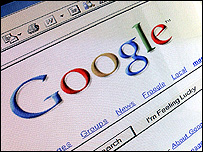
Google is to make available PDF files of classic books
|
Search engine Google has announced it will offer consumers the chance to download and print classic novels free of charge.
The move comes a day after New York-based Spiralfrog unveiled plans to launch a free legal music downloads service.
Spiralfrog's offer has the backing of the world's biggest music group, Vivendi Universal.
Free books, free music - is entertainment becoming just one big giveaway?
It's not quite as simple as that. Google's Books Library project and Spiralfrog's free music offer are two very different proposals with different aims in mind.
In Google's case, the idea is to offer books that are out of copyright, with authors who are long dead.
Two examples given are Dante's Inferno, which dates from the 14th Century, and Aesop's Fables, which go back as far as the 6th century BC.
These are works that are firmly in the public domain - and no-one's intellectual property rights are being infringed by their online publication. In the case of Aesop, it is not even certain that he ever existed.
Books by modern authors whose works are still subject to copyright will not be available through the Google service.
Copyright laws vary from country to country, but in general, written works by authors who have been dead for more than 70 years are no longer protected.
Fair enough for books, but what about free music?
Anyone who wanted to do for recorded music what Google is doing for books would soon become entangled in a complex web of international restrictions.
Under EU copyright law, music recordings are copyrighted for 50 years. After that, they are in the public domain and can be freely copied, as has already happened to Elvis Presley's earliest records.
But in the US, thanks to a series of overlapping federal and state laws, virtually all sound recordings are subject to legal protection until 2067.
It's probably just as well for US-based Spiralfrog that it has no intention of following the Google model.
Its plan is to license music legally from major record companies, paying all due royalties and behaving, in most respects, just like any other legal music download service.
The only difference is that whereas iTunes, Sony Connect and other online music stores charge per track, Spiralfrog will offer songs for free.
Spiralfrog believes that it can make money by subjecting its users to advertising instead of making them pay for the music - although whether this business model works or not will only become clear once the service is launched in December.
So what's the catch?
Well, some people are suspicious of Google's Books Library initiative, which is made possible by the collaboration of a number of universities in the UK and US.
They accuse the universities in question of "privatising" their libraries by linking up with a single digital provider - and Google of exploiting others' content to its financial advantage.
For its part, Google says its aim is to keep alive "backlist" and out-of-print books - not only by providing the full text of classic works, but also by putting more recent books into a searchable format that will make more people aware of their existence.
"How many users will find, and then buy, books they never could have discovered any other way? How many out-of-print and backlist titles will find new and renewed sales life?" argued Google's chief executive Eric Schmidt last year in defence of the wider project.
As for Spiralfrog, many potential users are likely to be deterred by the fact that, like other legal download sites, it will be offering music in Microsoft's WMA format, with full Digital Rights Management (DRM) protection.
Music downloaded illegally or "ripped" by users from their own CDs tends to come in the form of more versatile MP3 files - and people who already shun other legal download sites because of that format mismatch will not find Spiralfrog any more to their liking.


~RS~q~RS~~RS~z~RS~50~RS~)